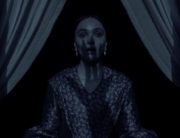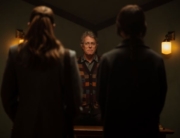
By all accounts, Gaia is a feature-length avant-garde prequel to the 2013 video game The Last of Us. I don’t mean this statement hyperbolically. Jaco Bouwer’s forest thriller depicts a nature-bound threat with such eerie resemblance to the iconic PlayStation post-apocalyptic game’s mutated cordyceps infection and monsters that you have to wonder if someone at game developer Naughty Dog secretly had a writing credit on the script. Everything outside those resemblances, by comparison, is uniquely haunting and unsettling in what it leaves unanswered.
Forest ranger Gabi (Monique Rockman) and her superior, Winston (Anthony Oseyemi), are paddling through a seemingly deserted woodland area and checking its terrain via drone cams. Unbeknownst to them, this area is inhabited by two men—a father and son—who are covered in mud, armed with bows and arrows, there to collect mushrooms and set up spike traps in the forest. Their paths collide when Gabi docks the boat to collect a faulty drone, only to get caught in one of the father and son’s Rambo-style mechanisms. With his radio damaged, Winston goes into the woods to rescue her unaware that: the men have already taken Gabi back to their cabin home, and something else dwells in this forest beyond anyone’s comprehension.
What this mysterious entity wants is unknown, but the father—the long-bearded and unhinged Barend (Carel Nel)—perceives it as God, something “older than human history.” Barend and his mostly mute son, Stefan (Alex van Dyk), visited this forest more than a decade ago as a final request for his late wife but since have become “its” worshippers and prisoners, living off the land while defending themselves from creatures produced by its spores. They help Gabi recover, but ultimately Barend views her as a mere extension of the outside world: an inept species responsible for irrevocably harming nature and currently sleepwalking toward its destruction. Gabi, of course, wants to escape when fully healed, but that might not be possible. Strange visions of the fungi entity regularly torment her, as well as the gradual spreading of nature all over her body.
The standout threats of Gaia are the entity’s fungi-crusted monsters. Bouwer’s SFX team nails their physical grotesqueness: mushrooms and mold overcrowding the head and shoulders, the molted skin, and the throat-gurgling screams. Yet the film takes its horror elements even further, with fungal mold rapidly spreading across tree bark while unearthly tendrils ambush the trio inside the cabin, growing as if they were controlled by an outside source. These supernatural properties are teased as hallucinatory at first, but as Gabi and the viewer discover subsequent examples of their power, they become impossible to wave away as a madman’s ramblings.
Rest assured though, there are plenty of ramblings. While the story isn’t necessarily post-apocalyptic, Barend treats the scenario as such, condemning humanity’s reliance on technology and linking its future to the behavior of caged primates. He’s fanatically beholden to the fungi and intent on making sure Stefan remains put, making Gabi’s knowledge of the outside world a threat to that power. However, the film struggles to flesh out these characters’ interplay beyond surface-level reactions, specifically the motives of Barend’s holy nature worship, despite Nel giving a vibrant performance.
Thankfully, the movie succeeds at putting viewers on edge. Bouwer makes the forest feel completely unsettling in its emptiness, lacking basic wildlife but occasionally giving off a macabre saprophyte image or fog of spores billowing in the dark. Gabi’s visions only amplify this unease, blending surreal and nightmarish imagery about the fungal deity’s power. It’s omnipresent yet alien. The movie makes the most of a limited setting while the performances convince us of a wider plague conceivably growing underneath the surface.
Gaia’s twisted visuals certainly fare better than its pedestrian characters, but the two halves still work together to produce a haunting tone and atmosphere. The makeup effects alone are deserving of worthwhile praise. Whether those designs tie into the dystopian plot of a certain upcoming HBO adaptation remains to be seen, but, if not, there’s still always the fun of headcanon narratives.
















Leave A Comment